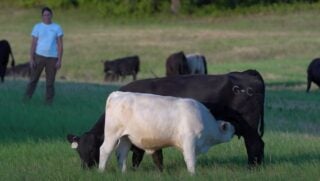“Food Evolution” is an agricultural documentary pertaining to GMOs. Most of us have heard about it, as it’s generated a significant amount of discussion in the months since it’s public release. It’s a film I’ve been excited to see, having heard overwhelmingly positive things about it. I was particularly happy to learn that, as of Sept. 21, it’s available on Hulu!
My overall review is that … it’s good! But one thing I was surprised about is how much airtime the anti-GMO crowd received. Folks such as Jeffrey Smith (a former dance instructor who has no background in farming and who claims he can fly) and Charles Benbrook (paid hundreds of thousands of dollars by organic food companies to skew data and push an agenda), among many others, received enough airtime to really get their points across. That was surprising to me, but valid to show that the film made the attempt to be unbiased in representing the public’s perceptions — this despite the fact these are anti-GMO voices that have long been known to not speak the truth about modern agriculture.
Even though the false accusations from the anti-GMO voices were given a platform, as I watched the film and took notes, one word particularly came to mind: balance. Narrated by Neil DeGrasse Tyson, the film does bring voices of science into the discussion of agriculture often. As he says, “The good thing about science is that it’s true whether or not you believe it.” Science is science regardless of your ideology. As a farmer I found his messages and the light shed on the importance of GMOs refreshing.
One question asked in the film was, “When was the last time you changed your mind on an issue of substance?” This made me think, because years ago I was actually an anti-GMO activist. It wasn’t until I began dating (and became!) a farmer and was presented with factual information (which went against those old views) that I changed my mind.
In a film of science-based reason, I believe the point gets driven home much stronger when there’s balance. This documentary wasn’t showing only one side of the coin or shoving a fear-based propaganda machine down your throats; they wanted to show both sides. And for that I am actually a little frustrated, but I still applaud them. The reason for frustration is that these insanely well-funded anti-GMO activists probably don’t deserve a platform whatsoever, but on the same token, it makes them look even more ridiculous after they claim “Food Evolution” is propaganda. Far from it. But … it’s really them calling the kettle black when they hypocritically fund agenda-driven movies like “Food, Inc.,” which don’t speak the truth about farming today.
It’s easier to sell fear than it is to sell science. If we used science-based education to sell people on food products, a majority would probably be boredom we rattle on about the differences of mutagenesis vs transgenesis in terms of “What is a GMO?” Many people against GMOs probably don’t even technically know what they are. Billions of meals have been eaten for decades with no harmful effects. GMOs are proven safe by pretty much every food safety authority in the world — cheese is a product of GMO biotechnology, so is insulin which saves lives regularly. The term “GMO” is actually somewhat scientifically meaningless considering everything we eat has had their genes altered or modified in some way, but it does help wealthy food corporations that are against genetic engineering sell more products through misinformation and scare tactics! To learn more about GMOs you can search the hashtag #FactsNotFear on social media.
GMOs come with huge advantages. This was explained through the film with good examples from places such as Uganda where the banana crop faces serious devastation from the bacterial wilt virus. By inserting a gene from a pepper plant, they can stop this disease just like they did with papaya, which can greatly improve both the lives of farmers and humanity in general. The papaya took seven years of research, and the farmers fought back against the anti-GMO activists in Hawaii to have the right to farm this brilliant technology, which sort of acts like a vaccine for the plant. Other GMOs allow farmers to grow more crops on less land, reduce their pesticide use, eliminate insecticide spray, be more drought tolerant, be enriched with more nutrients, or use less tillage, which improves erosion conditions and soil health. (Just to name a few!)
This is what is so frustrating about the debate. Everyone on both sides shares a common ground — everyone wants safe abundant food, everyone wants less chemicals, we all want a more sustainable food supply. The difference in the “pro” side stands with science and facts on their side with solid beneficial evidence. (As farmers, our fields are proof!) Safe to say we all want to help humanity, but the rich world shouldn’t be allowed to negatively impact the poor world. A South African farmer states in the film, “Every time you say no to GM technology, you are suppressing Africa.” Who opposes GMOs then, and why? Follow the money.
Science is so involved in food. What kind of future will we have if we turn our back on it? Watch “Food Evolution” to follow the journey of scientific advancements in agriculture that help to ensure the future of global food security, shining a light on these very important plant breeding tools.
Michelle Miller, the Farm Babe, is an Iowa-based farmer, public speaker and writer, who lives and works with her boyfriend on their farm which consists of row crops, beef cattle, and sheep. She believes education is key in bridging the gap between farmers and consumers.



